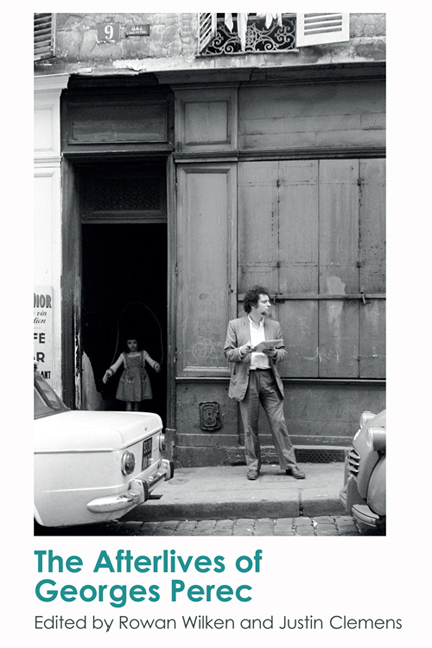Book contents
- Frontmatter
- Contents
- List of Figures
- Acknowledgements
- Notes on Contributors
- 1 Posthumous News: The Afterlives of Georges Perec
- PART I Art of the (Un)realisable
- PART II The Poetics of the Quotidian and Urban Space
- PART III Ludic Intensities and Creative Constraints
- 9 Perec and the Politics of Constraint
- 10 The Architecture of Constraint and Forgetting
- 11 Georges Perec: A Player's Manual
- PART IV Productive Problems of Description and Transcription
- Afterword
- Index
10 - The Architecture of Constraint and Forgetting
from PART III - Ludic Intensities and Creative Constraints
Published online by Cambridge University Press: 07 December 2017
- Frontmatter
- Contents
- List of Figures
- Acknowledgements
- Notes on Contributors
- 1 Posthumous News: The Afterlives of Georges Perec
- PART I Art of the (Un)realisable
- PART II The Poetics of the Quotidian and Urban Space
- PART III Ludic Intensities and Creative Constraints
- 9 Perec and the Politics of Constraint
- 10 The Architecture of Constraint and Forgetting
- 11 Georges Perec: A Player's Manual
- PART IV Productive Problems of Description and Transcription
- Afterword
- Index
Summary
ARCHITECTURE AND ITS INFATUATIONS WITH PHILOSOPHERS AND WRITERS
Each of the major thinkers of the late twentieth century engages architecture in some way, be that as subject, metaphor, evidence or ground. Fredric Jameson discerns in the Bonaventure Hotel the evidence of epistemic change, as does Peter Sloterdijk with the Crystal Palace. Roland Barthes finds the Eiffel Tower an exemplary artefact for understanding mythology, and Jacques Derrida elaborates deconstruction through Bernard Tschumi's Parc de la Villette and Daniel Libeskind's Jewish Museum. In turn, contemporary architects have demonstrated a voracious appetite for ideas from philosophers and writers, employing these as inspiration for design as much as for their explicatory potential on metaphysical, epistemological or aesthetic questions. Indeed, the past fifty years are coloured by architecture's successive engagements with continental and critical thought. Derrida's influence upon mainstream architecture begins with his 1982 collaboration with Peter Eisenman for the Parc de la Villette competition, reaches its zenith in the Deconstructivist Architecture exhibition at MOMA in 1988, and, in 2012, he is the subject of a conference that ‘hopes to re-establish the connections’ with his work. Bernard Cache's Earth Moves saw the first applied investigation of Gilles Deleuze's concept of the ‘fold’ in architecture, yet, by the 2004 special issue of Architecture Design on ‘Folding in Architecture’, such Deleuzian concepts as the ‘fold’, ‘smooth space’ and ‘faciality’ had been reduced to ‘a prescriptive repertoire of formal manoeuvres’.
These transactions have some enduring legacy after architects have exhausted the formal tropes generated by their readings of each thinker or writer. There is a healthy industry in explaining (or advocating) specific thinkers to subsequent generations, exemplified in Routledge's ‘Thinkers for Architects’ series. Launched in 2007 with Deleuze and Guattari for Architects by Andrew Ballantyne, it includes titles on Henri Lefebvre, Charles Goodman, Michel Foucault, Hans-Georg Gadamer, Jacques Derrida, Walter Benjamin, Pierre Bourdieu, Homi K. Bhabha, Luce Irigaray, Gilles Deleuze and Félix Guattari, and Martin Heidegger. A volume on Paul Virilio is forthcoming. In a similar vein, albeit slimmer, Leopold Lambert's 2013 ‘Funambulist Pamphlets’, published by Punctum Books, include volumes on Michel Foucault, Baruch Spinoza and Gilles Deleuze.
- Type
- Chapter
- Information
- The Afterlives of Georges Perec , pp. 171 - 188Publisher: Edinburgh University PressPrint publication year: 2017



